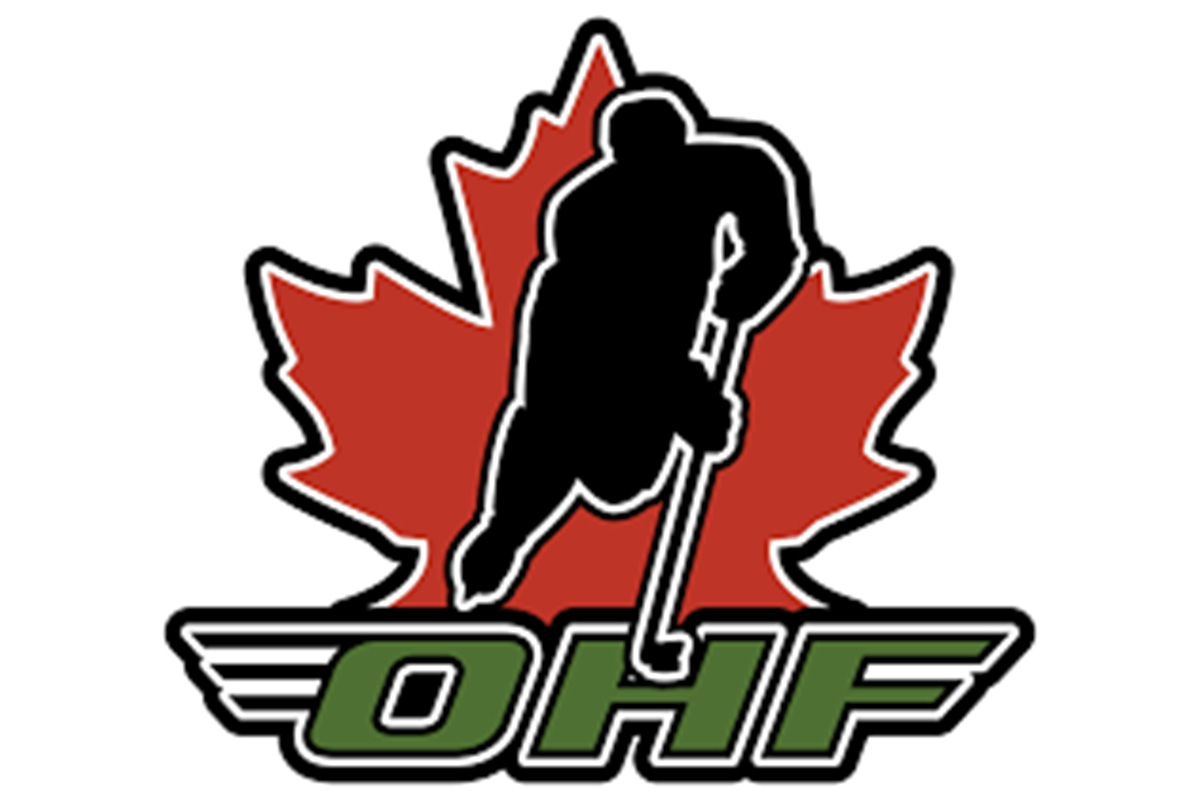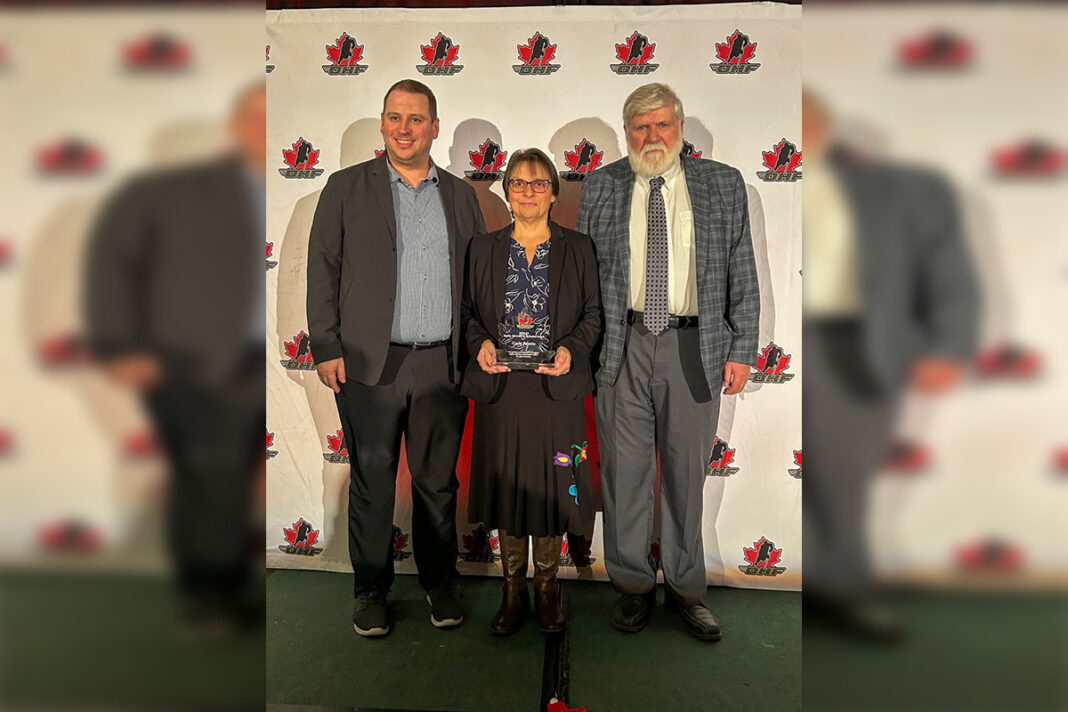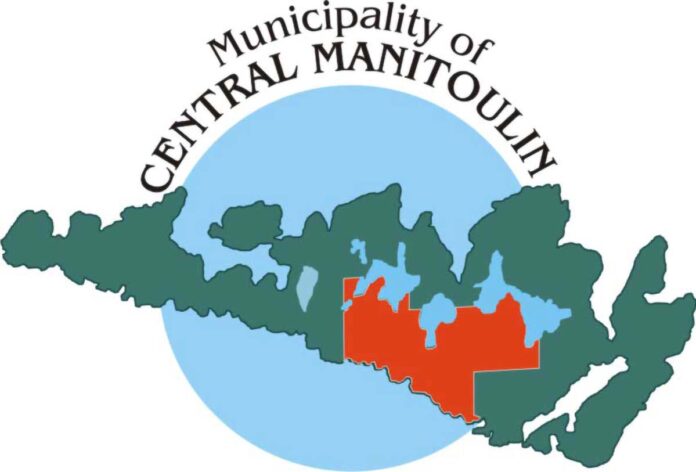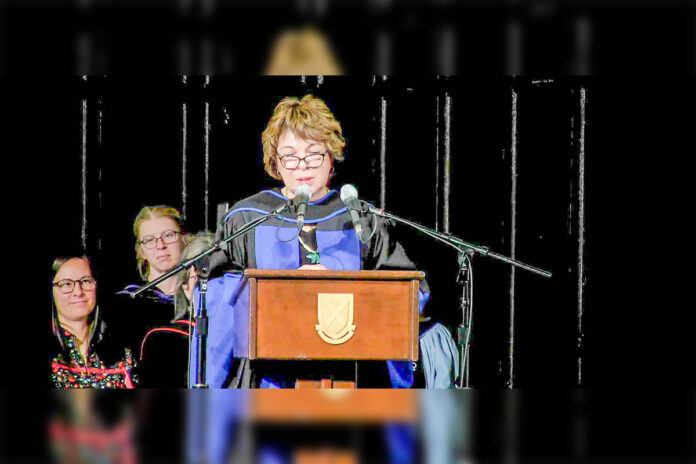Equity, Diversity and Inclusion Award
TORONTO—With over 30 years of involvement in hockey administration, dedication and commitment in helping in the lives of countless young people, Gayle Payette of M’Chigeeng First Nation has been awarded the first ever Ontario Hockey Federation (OHF) ‘Equity, Diversity and Inclusion Award.’
“Gayle’s background in the game and in providing support for First Nation peoples is significant,” said Jason Marchand, executive director of the OHF, who nominated her for the award. “In addition to being heavily involved in the game on Manitoulin Island, from a member of the Manitoulin Panthers organization to director representing the Island on the NOHA (Northern Ontario Hockey Association) board, she has also been significantly involved with M’Chigeeng First Nation in many different roles (councillor, health services committee chair, etc.), not only looking out for First Nations peoples, but always focusing on the best for all. Through her work in hockey, she has opened doors for many participants to play the game. She also has brought her experience and expertise into the boardroom as a means to educate others as well. As principal at the local elementary school (Lakeview), she continues to be a leader in her community.”
“When John Kastner, chair of the OHF called to tell me I had been selected for the award I was shocked,” Ms. Payette told The Expositor.

An OHF video outlining the award, which was presented to Ms. Payette on Saturday evening in Toronto states, “a true leader in Northern Ontario hockey and a pillar in her community for over 30 years of dedicated experience she has made a difference in the lives of countless young people. In her influential role, she has helped create an environment and commitment to fostering growth and inclusion.”
“Gayle has a constant belief in each player,” the OHF video states. Ms. Payette has “worked tirelessly for First Nations representation in the game and advocating for participation by players and is a trusted leader in the community of M’Chigeeng First Nation.”
“I initially became involved in hockey when my husband was a referee,” Ms. Payette told The Expositor. “I attended games that he officiated and was really disappointed in the way that people treated officials overall. The secretary position was vacant on the Manitoulin Minor Hockey Association and my husband encouraged me to be a part of the board because he knew that I would commit to the volunteer position with integrity. I was part of a board that had a vision for change and development in minor hockey. The president at the time advocated for all players and officials and lobbied for safety and participation of all.”
Ms. Payette explained, “my identify as a First Nation person from M’Chigeeng has me see everything with an open mind and heart. I advocate for everyone on the premise that roles, policies and regulations are being followed for the inclusion of all players and volunteers. I advocate based upon the need for mental well-being as I know that the impact of residential schools, the 60s scoop and the White Paper, has First Nation players dealing with past trauma and their healing process has to be understood. Being involved in hockey is a great venue to build inclusion, mutual respect, and understanding of all teammates and where they come from.”
“One major challenge that I have faced over the years is being female,” continued Ms. Payette. “When I first become involved in hockey, I was not treated the same as the male counterparts, my opinions did not seem to matter at that time, which pushed me harder to do my best and demonstrate that I knew rules and policies and that I could come up with practical solutions. I believe with the support of my husband, people began to understand that I was a person that would not back down or be intimidated. I have also been subject to racism, as a volunteer in hockey and as a hockey mom. That was hard to deal with, because they are like personal attacks on me and my family. My son encountered it on and off the ice. Encouraging him to be the better person was difficult. What does being the better person actually mean? For me, it was not that we were better than anyone else, it meant that we would do our best not to take it to heart and to not retaliate. When encountered, I would address the issue directly with the person and the hockey association, in a good way, allowing them to understand the impact that racism has on people, the mental health aspect especially. Over the years, I have always stressed the importance of mental health well-being.”
“I always advocate for awareness and understanding,” said Ms. Payette. “I encourage people to see things in other perspectives encouraging them to put themselves in certain situations and finding ways to cope and be able to move forward in a good way. I always promote success stories and I always support and guide when requested and I keep a positive mind set for the benefit of all.”
As for how Ms. Payette integrates her cultural background and values into her leadership across the board as a school principal, hockey administrator and community volunteer, “It is especially important to ‘walk the talk’ being able to act and be the person that I encourage others to be is important, being a good role model, sharing cultural knowledge openly without forcing it upon others to develop an understanding of where I come from and who I am is important. We all have hardships, it is important to understand how we deal with these hardships, how we cope, how we inspire, how we support, and how we are accepting of others, in order to live a good life.”
“I believe it has been important for me to be that First Nation female role model in the sport, to increase awareness regarding the roles that females have to play in and out of hockey and to increase awareness regarding the impact of inclusivity in a sport that is in need of change for the benefits of players to be involved, educated and aware of what they are able to contribute on and off the ice,” Ms. Payette continued. “My involvement has allowed governing organizations to develop an understanding of the dynamics of First Nation, Metis and Inuit communities and how to create a collaborating relationship for the benefit of all players.”
“While I was the president of the Manitoulin Panthers, I would include First Nation communities in opening ceremonies tournaments and invite singers to sing O Canada in their traditional language, providing tournament participants and fans with the opportunity to open their minds and hearts to see and understand various cultural norms, rather than make fun of them,” Ms. Payette said.
“Systemic changes that I believe are important to move forward are for people in general, to see each other as equals regardless of race or financial standing. Educating people regarding the barriers that underprivileged people face daily and providing opportunities to be involved in a way that is inviting rather than condescending,” said Ms. Payette. “I believe it is also important to continue to focus on mental health well-being, providing opportunities for counselling, support services, and meaningful team building activities inclusive of traditions or cultures of the variety of players or volunteers on teams. Understanding each other and recognizing cultures builds character amongst teammates, which they will carry with them for their lifelong journey.”
Ms. Payette said, “Bringing my background as an educator into the various roles that I have taken in hockey has increased my awareness regarding open-mindedness and ensuring that all perspectives are taken into consideration before a decision is made while ensuring that the best decision is made following pertinent policies that act in the best interests of the players, not necessarily what is in the best interest of the parents or caregiver. Our ultimate responsibility is to the players.”
“My involvement in hockey has added to my educational repertoire as well,” said Ms. Payette. “I encourage students to be active in all sports, to be respectful at all times, to congratulate others on their successes and to reflect on a daily basis on how to improve their personal well-being and for a healthy lifestyle.”
“There have been many occasions when I do not agree with the opinions or decisions of people or boards,” continued Ms. Payette. “However, I always demonstrate respect to them regarding their opinions or decisions. It’s so important to walk the talk, to listen with an open mind and heart, to act in the best interest of the players, to fully commit to a position when elected or volunteering and to be able to walk in another person’s shoes to fully understand who they are, and to make meaningful connections.”
Ms. Payette said, “My hockey journey has allowed me to meet many great people; volunteers, coaches, officials, fans, association members, and most importantly, players. The players have always been a part of my passion for the sport, ensuring that they have a place to play and are treated with respect.”
In her over 30 years involvement in hockey, Ms. Payette has served over this time as secretary of the Manitoulin Minor Hockey Association, novice team manager, president, secretary, vice-president, acting president/registrar and vice-president/registrar, and bantam team manager with the Manitoulin Panthers Hockey Association, vice president of the M’Chigeeng Minor Hockey Association, Nickel District Hockey League director/convenor, Prospects Youth Ball (15-17 year old) team manager, Legends men’s fastball team manager, District 7 council director and second vice-president of the Northern Ontario Hockey Association and director of the Ontario Hockey Federation.





